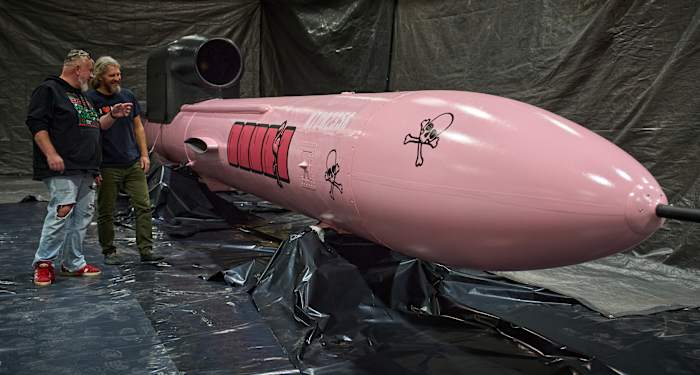Share this @internewscast.com

Mike Pompeo, the former U.S. Secretary of State, has taken on a new role as a member of the advisory board for Ukraine’s premier defense firm, known for its sophisticated long-range drones that have the capability to hit deep within Russian territory. This development comes amid an ongoing investigation into potential corruption within the company.
In a bid to bolster its global standing, the defense company, Fire Point, is launching a new manufacturing plant in Denmark and enlisting the expertise of distinguished figures from the industry. The company is also looking to expand its production capacity significantly, with ambitions to manufacture cruise missiles that have proven their effectiveness in battle.
Despite these advancements, the company finds itself under intense scrutiny due to the corruption probe. Fire Point’s leadership maintains that they are fully compliant with strict martial law regulations and have proactively commissioned an independent audit to address any concerns raised by investigators. Nonetheless, critics remain skeptical about the company’s obscure beginnings and its exclusive contracts with the Defense Ministry. They also raise concerns about alleged connections to Tymur Mindich, a controversial associate of President Volodymyr Zelenskyy, who is embroiled in a substantial corruption scandal.
“Overall, it’s positive that this investigation is underway,” commented Iryna Terekh, Fire Point’s Chief Technology Officer. “As a company, we fully support the ongoing investigation efforts.”
Terekh revealed that Fire Point has engaged a prominent international firm to perform an independent audit of its pricing strategies and production processes to mitigate any doubts. She highlighted that the investigation, initiated by anti-corruption bodies over a year ago, is still active. “We are anticipating the findings with interest,” she remarked.
The Associated Press was granted exclusive access to a Ukrainian facility where Fire Point’s cruise missile, dubbed the Flamingo or FP-5, is assembled. The location remains undisclosed to safeguard against potential Russian attacks.
Big plans
Fire Point, which rose to prominence after initially being relatively unknown following Russia’s full-scale invasion of Ukraine in February 2022, now reports around $1 billion in revenue this year. It is also constructing a factory in Denmark to manufacture essential rocket propellent.
In the meantime, the company is forging ahead with plans to expand.
The company launched an advisory board and named Pompeo as a member on Nov. 12, executives told AP. “It’s a big honor for us,” Terekh said, speaking from the factory floor. “We decided that since we are growing into a big international company, we have to ensure we are following the clearest and best corporate standards.”
Another three individuals will join the board. “We are rising as a company and we want a wise adviser board to help us establish this work,” said Terekh.
U.S. Special Envoy to Ukraine Keith Kellogg also visited one of Fire Point’s factories during his last visit, executives said, in a visit that included other Ukrainian defense technology companies as well.
Building on the success of its deep-strike drone, the FP-1, which AP was granted exclusive access to view in August, the company is now planning to ramp up production of its cruise missiles. They are also in high demand among Ukrainian forces as Western missiles remain hard to access in sufficient quantities to debilitate Russian capabilities.
Fire Point has successfully tested Flamingo on the battlefield at least four times, company executives said. In late August it was used to strike an FSB base in Armiansk in the occupied Crimean Peninsula. This week, the missile was used to strike targets in the Russian city of Oryol. The company did not provide its current production capacity, citing security concerns.
Production is going according to plans, company executives said, without elaborating on precise figures for security concerns.
On the factory floor, dozens of hollowed hulls of missile frames lay scattered. These are made with carbon fiber, a material better suited to eluding Russian radars than aluminum, Maksym, the head of design told the AP. He spoke on condition that only his first name be used for security reasons.
Fire Point is a significant beneficiary of the so-called Danish model, a financing mechanism spearheaded by Denmark, in which foreign governments directly fund Ukrainian defense companies, rather than procuring weapons from their own industries to send as aid. A factory to produce solid rocket fuel for missiles, including the Flamingo, is being established in Denmark.
“They did a great job helping us to secure production of critical components,” Terekh said of Denmark’s support. “Our factory in Denmark is dedicated to solve a bottleneck with solid rocket propellent.”
Ongoing investigation
But the company’s rapid rise has been marred by an investigation by Ukraine’s anti-corruption watchdogs.
Authorities are examining whether Fire Point inflated component prices or drone quantities in Defense Ministry contracts for its main weapon, the FP-1 drone, and are also scrutinizing potential links between the company and Mindich.
Anti-corruption agencies have said they were not investigating the Flamingo missile.
Lawmakers raised an issue with Fire Point because of its apparent monopoly over deep strike drones, its ability to garner lucrative contracts despite being relatively unknown, and obscurity over its ownership. Its legally listed owner is Yehor Skalyha, who maintains connections to the entertainment industry, just like Mindich.
Anti-corruption watchdogs have not released the findings of their investigation. Company founder Denys Shtilerman told AP that he is the majority owner, with Skalyha owning 2%.
Shtilerman said he has met Mindich on several occasions, but the company denies the business owner has any links to their company.
Crowdfunding and testing
On Sunday, engineers from the company painted a pink flamingo on one Flamingo cruise missile whose purchase had been made by a crowdfunding campaign by a Czech organization, Weapons to Ukraine. Each missile costs approximately $500,000.
The amount was raised in two days, said Jan Polak, a member of the organization. The same organization managed to fund the delivery of a Black Hawk helicopter to Ukraine’s military intelligence, Polak said. “We feel that they are fighting for us,” he said of his organization’s reasons for funding the procurement of missiles to strike Russian targets.
The current design of the Flamingo missile is a compilation of old Soviet weapons and new techniques. Engines were sourced from old Soviet jets, for example.
Testing and fine-tuning is a constant process, Maksym said. “As of now we are still doing training launching, because our rockets were manufactured just six months ago. Right now, we are training, but we are training on objects in the territory of Russia and Crimea,” he said.
Workers conducted a mock run of a launch with a missile, this one painted black, that will be used in a future mission, he said. Workers drove in a truck that concealed the weapon.
“We are studying, doing all we can to hit targets as far as we can,” he said, adding that finding ways around Russian radar systems and electronic warfare remained an ongoing challenge. “We are learning from each launch to work on mistakes.”
Copyright 2025 The Associated Press. All rights reserved. This material may not be published, broadcast, rewritten or redistributed without permission.












